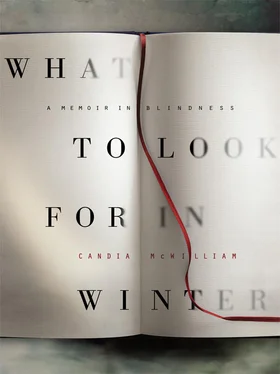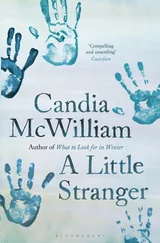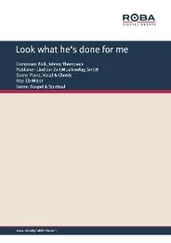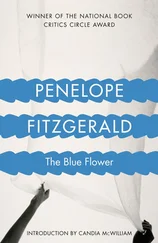An ebb so low is reached that I feel my thoughts dwindled to just the one thought trawling empty along the stony repetitious levels and approaching the underwater cave mouth I do not want to look into, covetable extinctness. Not extinction, extinctness. It is a wanting to be dead, not, emphatically, a wanting to die. Moreover I can see it off with various forms of everyday magic, from folding sheets to washing my hands with welcome soap. It’s just not practical, though, routinely to address low-grade thoughts of suicide early every afternoon if you can avoid it. It leaves a banal plaque on the mind and is no doubt antisocial, like bad breath. That is what it is, bad breath. The breath so bad, it stops at nothing.
Not that I believe that we do not, or should not, live with the present consciousness of death. Or try to, since of course we cannot. It’s one of the blessings my mother passed to me, that appetite for life in the face of death. And she did nothing but make the gift greater by her own sudden departure. I have often worried for friends who haven’t yet known death so close that it will break them. My mother in her dying gave me every single thing she had and turned a morbid child to life for life. I won’t take my own life unless its prolongation is causing distress to my children. By when I will be incapable…Ah no, there are ways and means. We must talk, my darlings, when the exact, the precise, moment presents itself.
As a child, I used to wish that you could, as you can with many things, do ‘nasties before nicies’ and get death over with, buy it off by volunteering to do it first. But it’s like washing up before you serve the food. The abundance will have its toll and leave its trace, and must be made as though it had not been. I cannot remember a time when I was unaware that those I loved could die at any moment.
I don’t think that innocence is the unawareness of death. I think it is, at its truest meaning, want of self-interest, an incapacity to receive pleasure from hurting another, and, at its least true extension, a sort of blindness willed by others. Although it was I who left him (something I think of and repent of maybe sixty times a waking day) I hanker for the innocence that was the world Fram and I had. Maybe it is just that it is available to regret the time before a catastrophe as prelapsarian. But that long mutuality feels like a close-sown flower meadow to me, a meadow that I harrowed up. Anyone raised with hymn-singing will hear the tone, the heart’s field red and torn, the foolish ways, the still small voice, the pity that dwells with the Peace of God.
My afternoon sleep is longer than is usual for a siesta and I feel a bit guilty about it, but if I don’t go to bed by three at the latest there will be the equivalent of tears before bedtime.
If I push on through the afternoon I unravel at the least thing. I don’t show it, but I direct at myself a regular stent of internal poison when I am tired and blindish, that can result in inelegant over-reaction to other people, extravagant concessiveness and really implausible self-sidelining or peculiar self-directed violence that is I suppose directed at the world.
It is like having been eaten by a gigantic menaced two-year-old and not being able to escape from her body. Since I am most often alone, these reactions may be to the radio or to an idea. If I don’t have those two hours of sleep, I start to disintegrate, to lose and cease to recognise myself.
It’s not, I don’t think, an Alzheimer’s-like cessation of recognition. I recognise my monster self, the self in whom the black humours run high, and I wish to bring it out into the light and scotch it like a snake. I tempt it out with a big bowl of rancour, watch it approach to drink, and wait to set about it with that knife of self-contempt. Failing the knife there is the cudgel of bleakness.
The bleakness involves taking a close look at what my actual situation is and turning away every time I offer myself some hope. It does not improve things that by this time in my unsighted day I shall have put blinkers on inside my head as well as the compromised sight beyond it, unless I keep things calmer with those two hours in the afternoon.
My dreams are still sighted in the way I used to be.
Perhaps now is the time to address any bright side of my not-seeing. I am used to looking for bright sides. Usually, though, being bright, they will have shown up if they are going to.
Long ago, when I was well inside my marriage’s shelter and could see, with no thought of either safety or sight being in question, I was much interested by the writing of Ved Mehta. His blindness, his Indianness, his dwelling in the reading world, his insistent intellectuality and his pursuit of love, his utter failure to accept that one mustn’t grumble, his want of need to camouflage within consensus, all appealed to me. Try as I might, I cannot find his work in recorded form. All these traits but blindness are shared by Fram, I see.
Why was I interested in blindness, so interested that throughout my reading life I sought out books about it? I think that it was simply an impossibly difficult state to imagine, and probably among the worst routine bad things that can happen. I think that I returned repeatedly to the matter of blindness because I believed, and do believe, that we are all to some extent metaphorically blind and this is something at which I have squinted, more or less blind-sidedly, in my work.
Or rather, I think that the gift is rarely given us to see ourselves as others see us, that we do not see others as they see themselves, or if we do they might have preferred that we had not, and I am sure that the whole event is but half glimpsed, if that.
I do not believe that when I was reading books about blindness, metaphorical or not, or by blind writers, by Stephen Kuusisto or José Saramago or Henry Green, let alone by Homer or Milton or Borges, I was stocking up in advance on works that would come to my rescue in my later darkness.
If a person who goes to prison happens to have by heart a good deal of verse, that is an arbitrary blessing, although a great one. We cannot prepare for these blows. All we can do is our best.
The shaman of Portobello had her pitch in the sort of set-up that is familiar if you have visited the fringes of alternative cure. Outside, it was an unexceptional shopfront in a small red Dumfries sandstone terrace of businesses, a tiler, a greengrocer, a Londis. To the left of the terrace a narrow close led down to the North Sea and its sandy shore, grey cockle and sea-glass sand crunching over and again under low waves that day.
I was early and had left my son to listen to his chosen writers at the Book Festival. He knew about the shaman and would have been happy to come along. In the event, I was glad he hadn’t so that the idea might remain in his mind’s tropical zone. At first, the impression was of an entranced and definitely decommissioned beauty parlour, with just a hint of those therapy rooms that induce a special claustrophobia relating to fruit tea and uncleanliness, lost hopes and women beyond romance having that new, fairly frugal, fling — with themselves.
I held open my eyes and peered through plate glass into the little carpeted shop beyond. The keynote shades were from the calming gamut. I am unsuited to alternative medicine. I do not like yellow on walls (or on book covers; the how-to-commit-suicide-and-not-be-found-out book is actually yellow, in a bossy life-affirming way). I am afraid that I will break wicker furniture. That said, I’m always curious about what is on people’s mugs. And if there is a mug tree, I learn something. Mugs don’t grow on trees.
On the wall behind the door, there were leaflets about hypnotherapy that had gone stiff on the noticeboard where rain had forced entry. There was an old and duly respected kettle, with a tray to catch its spillage, and a cloth for the handle. There were head massages on offer in the window from a young woman with a surname from deep in the Scots nobility; a novel in that, as in all disjointedness? She was also offering journeys into past lives at reasonable rates. There were long-overdry dried flowers.
Читать дальше











